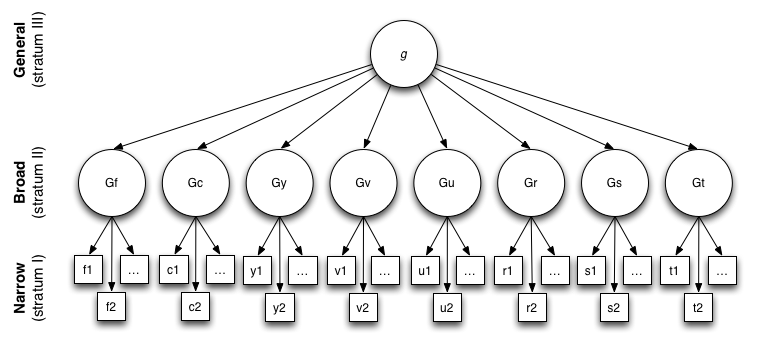人類智能

人類智能(英文:human intelligence)係指人類展現嘅智能。喺已知嘅生物當中,人類出嗮名喺智能上表現出眾:人類曉做(第啲動物做唔到嘅)複雜認知作業,而且具有自我意識[1]。
人類嘅智能令到佢哋能夠記住事物嘅特性(有陣時甚至唔使直接見過嗰樣事物),並且喺未來運用呢啲知識達到自己嘅目的,佢哋曉做複雜嘅學習、理解抽象嘅概念、做邏輯推理、搵出環境當中嘅規律、作出計劃同埋解決問題等等嘅認知功能,呢啲過程喺第啲動物身上都觀察得到,例如係貓同狗都好明顯識學習,但人類能夠靠佢哋嘅認知功能創造出一啲喺第啲動物當中睇唔到嘅嘢,例如係語言、文字以及一啲大過自己身體好多嘅建築物呀噉[2][3]。
理論模型
[編輯]g 因素
[編輯]一般智能因素(g-factor,全名 general intelligence factor)係個心理學上嘅概念[註 1]:
- 唔同嘅認知作業要求唔同嘅認知功能-有啲作業講求邏輯推理,有啲講求工作記憶,有啲講求創意... 等等;但心理學研究發現,一個個體喺咁多種唔同認知作業上嘅表現有明顯嘅正相關(correlation)-即係話喺某個認知功能上勁過平均嘅人,傾向(但唔一定)會喺第啲認知功能上都勁過平均,而喺某個認知功能上弱過平均嘅人,傾向(但唔一定)會喺第啲認知功能上都弱過平均
- 於是有廿世紀嘅心理學家提出,一個人腦(認知功能發生嘅主要場所)會具有一個所謂嘅一般智能因素,呢個因素獨力噉主宰住個人腦喺認知能力上嘅普遍表現。
打後嘅心理學家做咗一大輪嘅心理測量研究,量度人類受試者喺唔同認知作業上嘅表現,知道每位受試者喺每件作業上嘅分數,並且對攞到嘅數據做因素分析(factor analysis)等嘅統計分析;結果發現,人與人之間嘅唔同認知能力差異平均大約有成 40 至 50% 嘅都係源自一般智能因素上嘅差異嘅。呢柞研究確立咗一個諗法-人腦當中的確有某個因素,係能夠單獨噉反映個人「有幾聰明」嘅,而對智能有興趣嘅心理學家自然開始著手研究一般智能因素[4][5]。
第啲模型
[編輯]到咗廿一世紀初,重要嘅人類智能模型有以下呢啲[6]:
- 流動智能同固定智能(fluid and crystallized intelligence)-兩個因素:流動智能同固定智能係源自 1940 年代嘅一個諗法;根據呢個諗法,智能同智商由兩大因素組成[7][8]-
- 固定智能()係指建基於知識而展現出嚟嘅有智能行為,例如兩個人 A 君同 B 君,兩個推理能力都一樣咁勁,但 A 君已有嘅數學知識多啲,所以如果兩個人齊齊做「由手上嘅數學知識推理出新知識」嘅話,A 君表現好啲-A 君嘅 高啲;
- 相比之下,流動智能()係指唔使咩知識都可以展現得到出嚟嘅智能,例如兩個人 A 君同 B 君,兩個人嘅知識都一樣,然後兩個一齊學一樣技能(例如係鬭木或者畫畫呀噉),發覺 A 君學得快啲-「唔靠先前知識」展示出嘅智能就係所謂嘅 。有好多人都認為, 係智商測試應該要集中量度嘅嘢,所以啲智商測試好多時都盡可能會設計到(例如)唔使用語言-一種前置知識-都可以作答,例子可以睇里墳氏標準推理測驗嘅設計噉(下面)。
- 三層智能理論(three-stratum theory)-智能分三層:個理論建基於因素分析研究;研究者實際攞咗啲數據返嚟,用呢啲數據建立因素統計模型,主張一個三層嘅模型(下圖)[9][10]-

- 多元智能理論(theory of multiple intelligences)係一套有關「智能分多個因素」嘅理論。呢套理論承認人類智能可以分做多個因素,而且仲對「點樣先至可以算係一個智能因素」有所著墨;根據多元智能理論,攞一個智能因素 , 要達到多條條件,先可以算係一個智能因素,條件包括[12][13]-
... 呀噉。設計智商測試嘅過程通常都會用智能理論做起始點,俾研究者用嚟決定「個測試要用咩題目」等嘅嘢。
智商
[編輯]要對一般智能因素作出科學性嘅研究,就需要有方法量度呢個因素[14]。喺人類當中,人與人之間喺一般智能因素上嘅差異可以用智商(intelligence quotient,簡稱 IQ)呢個指標嚟量度。比較先進嘅智商測試大致上係建基於以下嘅思路嘅:
- 智能決定一個人普遍嘅認知能力,所以假想而家有一大柞考驗唔同認知能力嘅標準化問題,結合做一個測試;假設動機同專注力等嘅因素不變,一個人智能愈高理應會答啱愈多條問題;
- 於是心理學家攞若干個人做樣本,假設個樣本代表到人類總體,噉個樣本啲人喺個測試上嘅分數中位數(median)係 理應反映咗人類總體喺個測試上嘅分數中立數,代表住最平均嘅智商(一般會設做 100);
- 假想有個人喺個測試上嘅分數係 ( 係分數嘅標準差),理應表示佢嗰個分數代表高過平均兩個標準差嘅智商... 如此類推。
通常班心理學家跟手仲會做吓進一步嘅統計分析,例如搜集數據,睇吓個測試上嘅分數係咪能夠預測一啲已知同智能有關嘅變數。最後佢哋會得出一個能夠一定程度上量度一般智能因素嘅測試,其他研究者可以攞個測試嚟做第啲研究[15]。不過要留意嘅係,智商測試有好多唔同款,款款度嘅認知能力都有啲唔同,而是但搵個測試,都梗會有專家批評個測試冇充分噉量度某個重要嘅認知功能。

智商研究當中一個相當有爭議性嘅問題係「智商係咪天生?」。有唔少人主張智能係可以後天提升嘅。不過事實係研究顯示,一個大人嘅 IQ 有幾高喺好大程度上係由遺傳因素話事嘅-成年智商嘅遺傳度超過 60%,呢個結果表示,嘗試提高細路嘅智商的確有可能成功,但提高智商嘅措施好多時到咗成年嗰陣就會失效-一個本來智商平均、但因為呢啲提高智商嘅措施而提高咗智商嘅細路,大過咗之後多數會變返一般智商嘅大人。所以一般認為,智商同絕大多數心理特徵一樣,未見得係完全天生嘅,但好受遺傳因素影響[16]。
進化起源
[編輯]人類嘅高智能喺動物界當中好罕見,所以有好多科學家都覺得好奇:
| 「 | 人類嘅呢啲獨特能力係點進化出嚟嘅呢?
|
」 |
研究呢個課題嘅科學家會用多種方法,研究人類喺佢哋嘅進化史上有乜嘢有別於其他動物物種嘅經歷,而呢啲經歷有邊啲有可能引致人類進化出高嘅智能。不過到咗廿一世紀初,科學界對人類智能嘅進化仲未有一致嘅共識[17]。
喺廿一世紀初對人類智能嘅進化嘅研究當中,其中一個最受人採用嘅假說係社會腦假說(social brain hypothesis)。呢個假說係由英國人類學家羅賓·鄧巴(Robin Dunbar)提出,話人類之所以會進化出高度嘅智能,唔係因為要解決佢哋喺所住嘅生態系當中撞到嘅問題,而係為咗喺大又複雜嘅社會當中生存[18]:隨住早期人類開始聚埋一大羣生活,一個人每日都要應對好多人際關係,要記住大量嘅資訊,例如係「邊個邊個同首領關係好,要攀附」或者「邊個邊個做過好多衰嘢,信唔過」等等,而要記住呢啲資訊同喺同人相處嗰陣(冇意識噉)評估對方有幾信得過,就需要個腦有高度嘅運算能力,所以令人類喺物競天擇上有壓力要進化出運算能力更加勁嘅腦。不過呢個假說唔係人人都認同[19]。
註釋
[編輯]睇埋
[編輯]攷
[編輯]- ↑ Tirri, Nokelainen. Measuring Multiple Intelligences and Moral Sensitivities in Education. Springer. ISBN 978-94-6091-758-5.
- ↑ The traits that make human beings unique. BBC Future.
- ↑ Top 10 Things That Make Humans Special. LIVESCIENCE.
- ↑ Sternberg, R. J., & Grigorenko, E. L. (Eds.). (2002). The general factor of intelligence: How general is it?. Psychology Press.
- ↑ Colom, R., Jung, R. E., & Haier, R. J. (2006). Distributed brain sites for the g-factor of intelligence. Neuroimage, 31(3), 1359-1365.
- ↑ Conway, A. R., & Kovacs, K. (2015). New and emerging models of human intelligence 互聯網檔案館嘅歸檔,歸檔日期2022年2月8號,. (PDF). Wiley Interdisciplinary Reviews: Cognitive Science, 6(5), 419-426.
- ↑ Cattell, R. B. (1963). "Theory of fluid and crystallized intelligence: A critical experiment". Journal of Educational Psychology. 54: 1-22.
- ↑ Lubinski, David (2004). "Introduction to the Special Section on Cognitive Abilities: 100 Years After Spearman's (1904) "'General Intelligence,' Objectively Determined and Measured"". Journal of Personality and Social Psychology. 86 (1): 96-111.
- ↑ J. B. Carroll (1993), Human cognitive abilities: A survey of factor-analytic studies, Cambridge University Press, New York, NY, USA.
- ↑ J. B. Carroll (1997), "The three-stratum theory of cognitive abilities" in D. P. Flanagan, J. L. Genshaft et al., Contemporary intellectual assessment: Theories, tests, and issues, Guilford Press, New York, NY, USA, pp. 122-130.
- ↑ Wasserman, John D. (2019-07-03). "Deconstructing CHC". Applied Measurement in Education. 32 (3): 249-268.
- ↑ Gardner, Howard. Frames of Mind: The Theory of Multiple Intelligences (1983).
- ↑ Davis, Katie; Christodoulou, Joanna; Seider, Scott; Gardner, Howard (2011), "The Theory of Multiple Intelligences", in Sternberg, Robert J.; Kaufman, Barry (eds.), The Cambridge Handbook of Intelligence, Cambridge University Press, pp. 485-503.
- ↑ Paulhus, D. L., Lysy, D. C., & Yik, M. S. (1998). Self-report measures of intelligence: Are they useful as proxy IQ tests?. Journal of personality, 66(4), 525-554.
- ↑ Alfred Binet and the History of IQ Testing.
- ↑ Panizzon, Matthew S., et al. "Genetic and environmental influences on general cognitive ability: Is g a valid latent construct?." Intelligence 43 (2014): 65-76.
- ↑ Byrne, Richard W. (1995) The Thinking Ape: Evolutionary origins of intelligence Oxford University Press, Oxford, England.
- ↑ Dunbar, R. I. M. (1998). "The social brain hypothesis". Evolutionary Anthropology: Issues, News, and Reviews. 6 (5): 178-90.
- ↑ David-Barrett, T.; Dunbar, R.I.M. (2013). "Processing Power Limits Social Group Size: Computational Evidence for the Cognitive Costs of Sociality". Proceedings of the Royal Society B. 280 (1765): 20131151.






